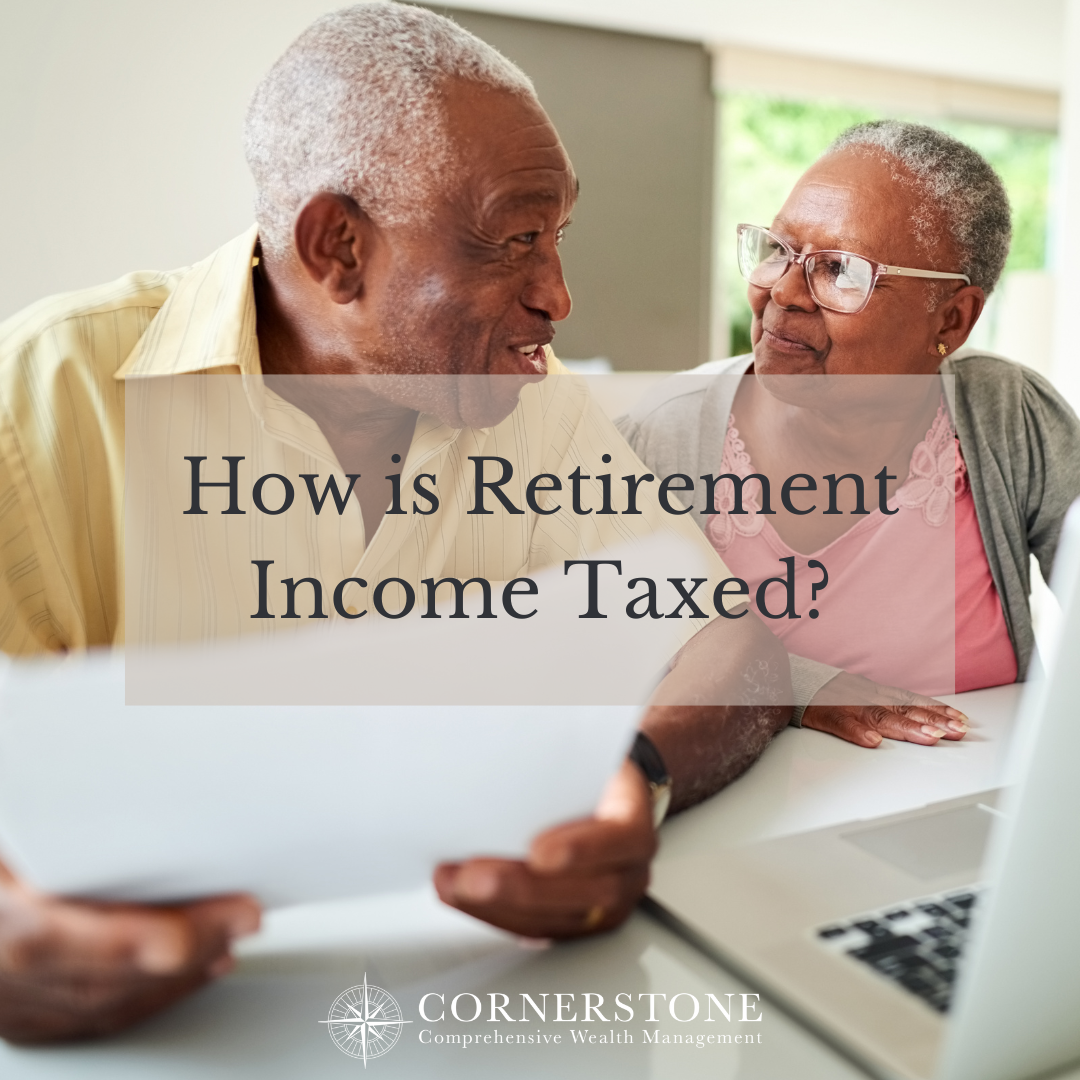How is Retirement Income Taxed?
Austin Carroll is a financial advisor at Cornerstone based in Reno, NV. Austin has passed his Series 65 Securities Registration Examination. He helps clients create customized financial plans based on their unique financial goals by addressing topics such as income, investments, and taxes.
HOW IS RETIREMENT INCOME TAXED?
As you move into retirement you now have more control over how you are taxed and how you pay your taxes. Depending on where you take your income from and whether the accounts are tax-deferred or tax-free, can mean the difference in saving thousands of dollars in taxes. If done correctly, you could even find yourself in a zero percent tax bracket.
As a reminder, these are just generalizations, and you should always discuss specifics with a qualified financial professional. But to give you an idea of how your retirement income is taxed, here’s a breakdown of the most common retirement accounts and how those are taxed.
1. HOW IS MY 401K AND IRA TAXED?
You’re probably like most retirees and have some money saved in your IRA or 401(k). You may not be sure as to how it’s going to be taxed when you start to withdraw those funds for retirement. This isn’t limited to anyone with a 401(k) and IRA, this really includes anyone with an account from the Employee Retirement Income Security Act (ERISA). These accounts could include your approved taxed deferred accounts such as an IRA, SEP, SIMPLE, 401(k), 403(b), 457, etc.
When you were working all those years and contributing a portion of your paycheck to save for retirement, you were deferring your taxes to a later date. In fact, when you pull that money out now that you are retired, you will still pay earned income on the total that you withdraw. That means if you are in a lower tax bracket during retirement it might benefit you to use this strategy.
However, things change once you start your required minimum distributions (RMDs). Some people may find themselves in an even higher tax bracket than when they were working. If this is you, don’t worry because there are ways to combat this. Reaching out to your financial advisor can help you better understand what you can do to minimize your taxes in retirement.
2. HOW IS MY ROTH 401K AND ROTH IRA TAXED?
If you are one of the lucky ones that learned about Roth accounts and how they work, then congratulations on having some tax-free money! Roth accounts can be powerful tools for retirees in helping lower their taxes or even eliminate their income tax burden.
When you are working and contributing money to your Roth accounts, you are putting money in the account on an after-tax basis, meaning that you already paid the taxes. In other words, there will be no surprises on the amount you’ll get from your Roth accounts.
Another benefit to the Roth account is that all the earnings are tax free. So, when you withdraw money, those withdrawals are also free from tax. Meaning, if you are withdrawing all your money from your Roth account and Social Security, you don’t have earned income. Thus, eliminating income taxes for the year and allowing you to be in a zero percent tax bracket. This is because Social Security is taxed based upon whether you have crossed certain thresholds for earned income.
One of the downsides of a Roth account is that you paid your taxes when the money went in. So if taxes do go down, you might have overpaid for taxes, but that’s a big “IF.” Only about 4% of retirees actually end up in a lower tax bracket in retirement. So, taking the gamble on if taxes will be lower by the time you retire, may not be worth it.
HOW TO MINIMIZE YOUR TAXES IN RETIREMENT
Every person’s situation is different, but most people want to minimize the amount of taxes in their retirement. If that’s you, meeting with a financial advisor at Cornerstone Comprehensive Wealth Management could be the way to reduce your taxes.
Our Cornerstone Retirement Tax Savings Analysis can help design a retirement plan that takes the fear out of your financial future so you can enjoy your time. You envision the life you want to live, and we’ll help you create a plan to live out your ideal retirement. To see what your personalized analysis looks like, call out office at 775.853.9033 to schedule an appointment with our team.



